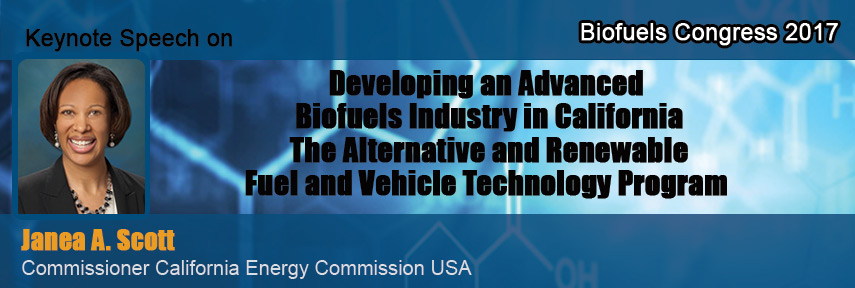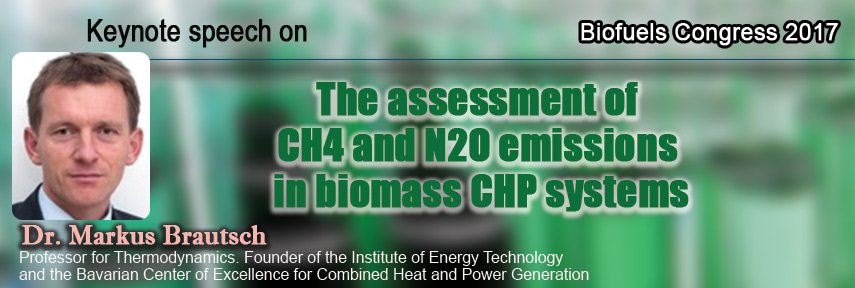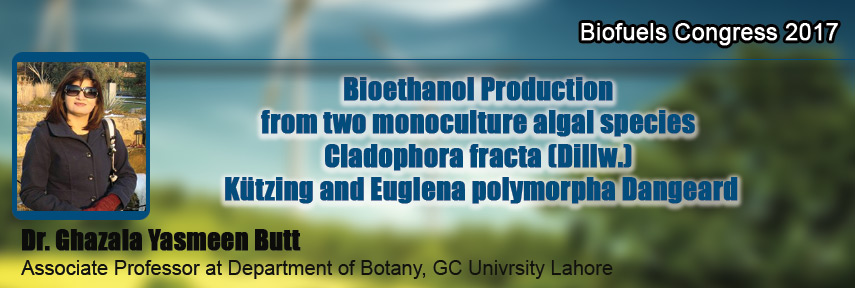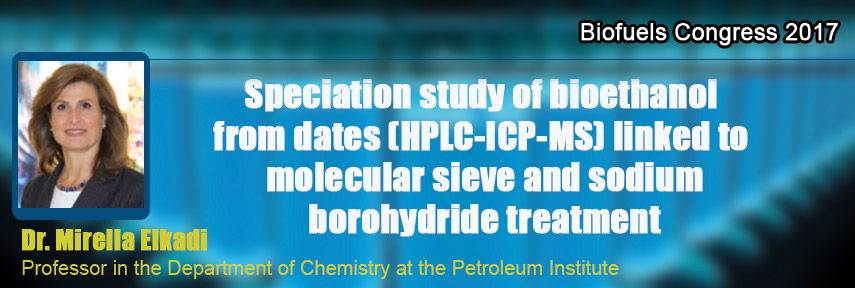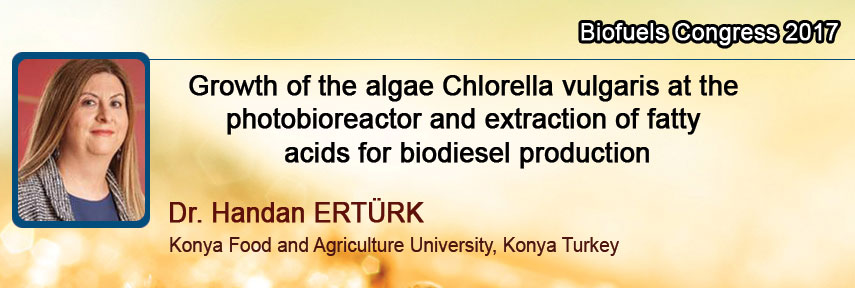Theme:
Biofuels Congress 2017
Conference Series Ltd proudly invites contributors across the globe to its 6th World Congress on Biofuels and Bioenergy to be held during September 05-06, 2017 at London, UK which includes prompt Keynote Presentations, Oral Talks, Poster Presentations and Exhibitions.
Summary of Market Analysis
The perception of biofuels has prevailed since the invention of the motor vehicle. For example, at the dawn of the 20th century, Henry Ford planned to power his Model Ts using ethanol, and initial diesel engines consumed peanut oil for running. With the discovery of immense petroleum deposits, gasoline and diesel was accessible reasonably, thereby confiding biofuels to the background. Nonetheless, the recent surge in oil prices, added with mounting worries related to global warming linked with carbon dioxide (CO2), emissions have culminated in the re-emergence of biofuels as feasible alternatives. Biofuel is manufactured using a wide range of resources. This variety has grown notably in recent years, aiding shape a dexterous industry that is steadily searching for new technologies and feedstock. In fact, industry demand for reasonable, candid sources of fats and oils is bracing promising research on advanced feedstock such as Algae and Camelina. With more than a decade of commercial-scale production, the industry takes pride in its meticulous approach to improvement and strong target on sustainability. Production has risen from around 25 million gallons in the early 2000s to about 1.7 billion gallons advanced biofuel in 2014. With projected feedstock availability, the industry has settled a goal of manufacturing about 10 percent of the diesel transportation market by 2022. The industry’s economic impact is hovered to thrive significantly with pursued production increases. The industry backs jobs in diverse sectors, from manufacturing to transportation, agriculture and service. Biodiesel is produced using a broad variety of resources. We welcome you, on behalf of the Organizing Committee, to this exemplary meeting with eminent scientists from different countries around the globe and sharing new and intriguing conclusions in Biodiesel production and usage.This inspiring and enlightening conference program including plenary lectures, symposia, workshops on a variety of topics, poster presentations and various programs for participants from all over the world.
Target Audience
Biofuels & Bioenergy- 2017 is expecting the participants from all over the globe in various fields. This combination of audience will give an ideal blend to justify our theme “Integration of Advanced Biofuels in the Circular Economy.” Biofuels & Bioenergy-2017 expecting attendees from
- Fuel Engineers
- Chemical Engineers
- Professors, Researchers, Students and Technical Staff from the field of Chemical Engineering
- Engineers and Delegates from Aviation and Automobile companies
- Directors/Co-Directors of Research based companies across Europe and US who are investing in Biofuels and Bioenergy
Track -1: Advanced Biofuels
Advanced biofuels are fuels that can be processed from numerous types of biomass. First generation biofuels are processed from the sugars and vegetable oils formed in arable crops, which can be smoothly extracted applying conventional technology. In comparison, advanced biofuels are made from lignocellulose biomass or woody crops, agricultural residues or waste, which makes it tougher to extract the requisite fuel. Advanced biofuel technologies have been devised because first generation biofuels manufacture has major limitations. First generation biofuel processes are convenient but restrained in most cases: there is a limit above which they cannot yield enough biofuel without forbidding food supplies and biodiversity. Many first generation biofuels rely on subsidies and are not cost competitive with prevailing fossil fuels such as oil, and some of them yield only limited greenhouse gas emissions savings. When considering emissions from production and transport, life-cycle assessment from first generation biofuels usually approach those of traditional fossil fuels. Advanced biofuels can aid resolving these complications and can impart a greater proportion of global fuel supply affordably, sustainably and with larger environmental interests.
- Nonfood crops for biofuels production
- Lignocellulosic Biomass
- Thermochemical Routes
- Syngas from Biomass
- Second generation biofuels
- Microbial pathways for advanced biofuels production
- Synthesis of advanced biofuels
- Advanced biofuels from pyrolysis oil
Related Conferences on Advanced Biofuels
3rd Annual Congress on Biofuels and Bioenergy April 27-28, 2017 Dubai, UAE; International Conference on Chemical and Biochemical Engineering June 7-8, 2017 Milano, Italy; International Conference on Renewable Energy and Resources July 24-26, 2017 Vancouver, Canada; 7th International Biofuels and Bioenergy Congress October 2-4, 2017 Toronto, Canada; 2nd World Congress on Biodiesel & Expo December 4-5, 2017 Atlanta, USA; 5th World Bioenergy Congress and Expo June 29-30, 2017 Madrid, Spain; 2nd Euro Global Biomass Summit October 12-13, 2017 London, UK; European Conference on Biomass and Exhibition June 12-15, 2017 Stockholm, Sweden; 6th annual event on Global Energy Forum January 26-27, USA; 6th International Conference on Biorefinery. The Chateau on the Park, January 18-21, 2017 Christchurch, New Zealand; 4th International Conference Progress in Biogas March 8-11 2017 in Stuttgart, Germany; 7th International Conference on Algal Biomass, Biofuels and Bioproducts June 18 - 21, 2017 Miami, FL, USA; The Bioenergy Association of California; World Bioenergy Association.
Related Societies
Society of Agricultural and Biological Engineers, America, American Chemical Society, America, Belgian Society of Biochemistry, Belgium, Canadian Society for Chemical Technology, Canada, Chinese-American Chemical Society, China, Biochemical Society, Belgium, Danish Chemical Society, Denmark, Korean Chemical Society, Korea, Norwegian Chemical Society, Norway, Society for Chemical Engineering, North America, European Society of Biochemical Engineering Sciences, Europe, Society of Chemical Engineers, New Zealand, Nigerian Society of Chemical Engineers, Africa, Israel Institute of Chemical Engineers, Israel, French Society of Process Engineering, France.
Track – 2: Algae Biofuels
Algae fuel or algal biofuel is a substitute to liquid fossil fuels that utilizes algae as its source of energy-rich oils. Also, algae fuels are a substitute to common known biofuel sources, such as corn and sugarcane. Various companies and government agencies are sponsoring efforts to reduce capital and operating costs and make algae fuel production commercially feasible. Like fossil fuel, algae fuel releases CO2 when burnt, but unlike fossil fuel, algae fuel and other biofuels only release CO2 recently withdrawn from the atmosphere via photosynthesis as the algae or plant grew. The energy crisis and the world food crisis have sparked interest in alga culture (farming algae) for making biodiesel and other biofuels utilizing land unbefitting for agriculture. Among algal fuels' attractive characteristics are that they can be cultivated with negligible impact on fresh water resources, can be generated using saline and wastewater, have a high flash point, and are biodegradable and comparatively harmless to the environment if spilled. Algae cost more per unit mass than other advanced biofuel crops due to high capital and operating costs, but are declared to generate between 10 and 100 times more fuel per unit area.
- Culturing Algae
- Harvesting and oil extraction system
- Cyanobacterial biofuels production
- Commercialization of algae biofuels
- Wastewater based algae biofuels production
- Algal bio sequestration
- Advances in algal biofuel production
- Biofuels from microalgae and Microbes
Related Conferences on Algae Biofuels
7th International Biofuels and Bioenergy Congress October 2-4, 2017 Toronto, Canada; 3rd Annual Congress on Biofuels and Bioenergy April 27-28, 2017 Dubai, UAE; International Conference on Chemical and Biochemical Engineering June 7-8, 2017 Milano, Italy; International Conference on Renewable Energy and Resources July 24-26, 2017 Vancouver, Canada; 2nd World Congress on Biodiesel & Expo December 4-5, 2017 Atlanta, USA; 5th World Bioenergy Congress and Expo June 29-30, 2017 Madrid, Spain; 2nd Euro Global Biomass Summit October 12-13, 2017 London, UK; European Biomass Conference and Exhibition June 12-15, 2017 Stockholm, Sweden; 6th annual event on Global Energy Forum January 26-27, USA; 7th International Conference on Algal Biomass, Biofuels and Bioproducts June 18 - 21 2017 Miami, FL, USA; 6th International Conference on Biorefinery. The Chateau on the Park, January 18-21, 2017 Christchurch, New Zealand; 4th International Conference Progress in Biogas March 8-11 2017 in Stuttgart, Germany; 7th International Conference on Algal Biomass, Biofuels and Bioproducts June 18 - 21, 2017 Miami, FL, USA; The Bioenergy Association of California; World Bioenergy Association..
Related Societies
Society of Agricultural and Biological Engineers, America, American Chemical Society, America, Belgian Society of Biochemistry, Belgium, Canadian Society for Chemical Technology, Canada, Chinese-American Chemical Society, China, Biochemical Society, Belgium, Danish Chemical Society, Denmark, Korean Chemical Society, Korea, Norwegian Chemical Society, Norway, Society for Chemical Engineering, North America, European Society of Biochemical Engineering Sciences, Europe, Society of Chemical Engineers, New Zealand, Nigerian Society of Chemical Engineers, Africa, Israel Institute of Chemical Engineers, Israel, French Society of Process Engineering, France.
Track – 3: Aviation Biofuels
Aviation biofuel is a biofuel utilized for aircraft. It is reckoned by some to be the paramount means by which the aviation industry can diminish its carbon footprint. After a multi-year technical analysis from aircraft makers, engine manufacturers and oil companies, biofuels were advocated for commercial use in July 2011. Since then, some airlines have evaluated with using of biofuels on commercial flights. The limelight of the industry has now curved to advanced sustainable biofuels (second generation sustainable aviation fuels) that do not compete with food supplies nor are major consumers of prime agricultural land or fresh water.
- Developing new sources for aviation biofuels
- Commercialization of aviation biofuels
- Applications of aviation biofuels
- Jet biofuel
- Green replacement fuels in flights
- Synthesis of aviation biofuel via Fischer-Tropsch process
- Cost reduction policies
- Large scale biogas production & challenges
- Risk analysis of aviation fuels
Related Conferences on Aviation Biofuels
3rd Annual Congress on Biofuels and Bioenergy April 27-28, 2017 Dubai, UAE; International Conference on Chemical and Biochemical Engineering June 7-8, 2017 Milano, Italy; International Conference on Renewable Energy and Resources July 24-26, 2017 Vancouver, Canada; 7th International Biofuels and Bioenergy Congress October 2-4, 2017 Toronto, Canada; 2nd World Congress on Biodiesel & Expo December 4-5, 2017 Atlanta, USA; 5th World Bioenergy Congress and Expo June 29-30, 2017 Madrid, Spain; 2nd Euro Global Biomass Summit October 12-13, 2017 London, UK; European Biomass Conference and Exhibition June 12-15, 2017 Stockholm, Sweden; 6th annual event on Global Energy Forum January 26-27, USA; 6th International Conference on Biorefinery. The Chateau on the Park, January 18-21, 2017 Christchurch, New Zealand; 4th International Conference Progress in Biogas March 8-11 2017 in Stuttgart, Germany; 7th International Conference on Algal Biomass, Biofuels and Bioproducts June 18 - 21, 2017 Miami, FL, USA; The Bioenergy Association of California; World Bioenergy Association.
Related Societies
Society of Agricultural and Biological Engineers, America, American Chemical Society, America, Belgian Society of Biochemistry, Belgium, Canadian Society for Chemical Technology, Canada, Chinese-American Chemical Society, China, Biochemical Society, Belgium, Danish Chemical Society, Denmark, Korean Chemical Society, Korea, Norwegian Chemical Society, Norway, Society for Chemical Engineering, North America, European Society of Biochemical Engineering Sciences, Europe, Society of Chemical Engineers, New Zealand, Nigerian Society of Chemical Engineers, Africa, Israel Institute of Chemical Engineers, Israel, French Society of Process Engineering, France.
Track – 4: Biomass
Biomass is organic matter extracted from living, or recently living organisms. Biomass can be utilized as a source of energy and it most often directs to plants or plant-based matter which are not used for food or feed, and are precisely called lignocellulosic biomass. As an energy source, biomass can either be used directly via combustion to produce heat, or secondarily after transforming it to numerous forms of biofuel. Conversion of biomass to biofuel can be attained by various methods which are mainly categorized into: thermal, chemical, and biochemical methods. Biomass is a renewable source of fuel to yield energy since waste residues will always prevail – in forms of scrap wood, mill residuals and forest resources and properly directed forests will always have additional trees, and we will invariably have crops and the unconsumed biological matter from those crops.
- Conversion technologies
- Sustainable feedstock development
- Biomass and electricity
- Industrial waste biomass
- Recent developments in sustainable biomass
- Perennial biomass feedstock’s
- Integrated biomass technologies
Related Conferences on Biomass
5th World Bioenergy Congress and Expo June 29-30, 2017 Madrid, Spain; 3rd Annual Congress on Biofuels and Bioenergy April 27-28, 2017 Dubai, UAE; International Conference on Chemical and Biochemical Engineering June 7-8, 2017 Milano, Italy; International Conference on Renewable Energy and Resources July 24-26, 2017 Vancouver, Canada; 7th International Biofuels and Bioenergy Congress October 2-4, 2017 Toronto, Canada; 2nd World Congress on Biodiesel & Expo December 4-5, 2017 Atlanta, USA; 2nd Euro Global Biomass Summit October 12-13, 2017 London, UK; European Biomass Conference and Exhibition June 12-15, 2017 Stockholm, Sweden; International Conference on Biomass April 10-12, 2017 Minneapolis, MN; 19th International Conference on Bioenergy, Biogas and Biogas Production May 04-05, 2017 Rome, Italy; Conference on Value of Biogas West, January 27, 2017 Canada; Conference on Value of Biogas East March 23-24, 2017 Canada; The Bioenergy Association of California; World Bioenergy Association.
Related Societies
Society of Agricultural and Biological Engineers, America, American Chemical Society, America, Belgian Society of Biochemistry, Belgium, Canadian Society for Chemical Technology, Canada, Chinese-American Chemical Society, China, Biochemical Society, Belgium, Danish Chemical Society, Denmark, Korean Chemical Society, Korea, Norwegian Chemical Society, Norway, Society for Chemical Engineering, North America, European Society of Biochemical Engineering Sciences, Europe, Society of Chemical Engineers, New Zealand, Nigerian Society of Chemical Engineers, Africa, Israel Institute of Chemical Engineers, Israel, French Society of Process Engineering, France.
Track – 5: Biogas
Biogas commonly refers to a mixture of various gases formed by the disintegration of organic matter in the absence of oxygen. Biogas can be manufactured from raw matters such as agricultural waste, municipal waste, manure, plant material, green waste, and sewage or food waste. Biogas is a renewable energy source and in diverse cases exerts a limited carbon footprint. Biogas can be manufactured by fermentation of biodegradable materials or anaerobic digestion with anaerobic organisms, which disintegrates material inside an isolated system. Biogas is basically methane (CH4) and carbon dioxide (CO2) and may have small traces of hydrogen sulfide (H2S), siloxanes and moisture. The gases methane, carbon monoxide (CO) and hydrogen can be combusted or oxidized with oxygen. This energy yield allows biogas to be benefitted as a fuel; it can be utilized for any heating purpose, such as cooking. It can also be practiced in a gas engine to transform the energy in the gas to electricity and heat.
- Biogas from agricultural waste
- Biogas from algae
- New & possible substrates for biogas production
- Biogas technologies
- Anaerobic packed-bed biogas reactors
- Biogas production
Related Conferences on Biogas
7th International Biofuels and Bioenergy Congress October 2-4, 2017 Toronto, Canada; 5th World Bioenergy Congress and Expo June 29-30, 2017 Madrid, Spain; 3rd Annual Congress on Biofuels and Bioenergy April 27-28, 2017 Dubai, UAE; International Conference on Chemical and Biochemical Engineering June 7-8, 2017 Milano, Italy; International Conference on Renewable Energy and Resources July 24-26, 2017 Vancouver, Canada; 2nd World Congress on Biodiesel & Expo December 4-5, 2017 Atlanta, USA; 2nd Euro Global Biomass Summit October 12-13, 2017 London, UK. European Biomass Conference and Exhibition June 12-15, 2017 Stockholm, Sweden; International Conference on Biomass April 10-12, 2017 Minneapolis, MN; Conference on Biogas Expo February 8-9, 2017 Offenburg, Germany; 19th International Conference on Bioenergy, Biogas and Biogas Production May 04-05, 2017 Rome, Italy; Conference on Value of Biogas West, January 27, 2017 Canada; Conference on Value of Biogas East March 23-24, 2017 Canada; The Bioenergy Association of California; World Bioenergy Association.
Related Societies
Society of Agricultural and Biological Engineers, America, American Chemical Society, America, Belgian Society of Biochemistry, Belgium, Canadian Society for Chemical Technology, Canada, Chinese-American Chemical Society, China, Biochemical Society, Belgium, Danish Chemical Society, Denmark, Korean Chemical Society, Korea, Norwegian Chemical Society, Norway, Society for Chemical Engineering, North America, European Society of Biochemical Engineering Sciences, Europe, Society of Chemical Engineers, New Zealand, Nigerian Society of Chemical Engineers, Africa, Israel Institute of Chemical Engineers, Israel, French Society of Process Engineering, France.
Track – 6: Biodiesel
Biodiesel indicates an animal fat-based or vegetable oil diesel fuel comprising of long-chain alkyl (methyl, ethyl, or propyl) esters. Biodiesel is customarily made by chemically reacting lipids (e.g., soybean oil, vegetable oil, animal fat (tallow)) with an alcohol generating fatty acid esters. Biodiesel is suggested to be utilized in standard diesel engines and is thus well-defined from the vegetable and waste oils used to operate fuel converted diesel engines. Biodiesel can be used singly, or blended with petro diesel in any proportions. Biodiesel blends can also be utilized as heating oil.
- Biodiesel Production
- Biodiesel feedstock’s
- Efficiency and economic arguments
- Biodiesel to hydrogen-cell power
- Crops for biodiesel production
- Biodiesel as automobile fuel
- Cost effective techniques for biodiesel production
- Biodiesel production on industry level and scale up
- Impact of biodiesel on pollutant emissions and public health
- Chemical Biomass to Liquid Fuel Transformations
Related Conferences on Biodiesel
2nd World Congress on Biodiesel & Expo December 4-5, 2017 Atlanta, USA; 7th International Biofuels and Bioenergy Congress October 2-4, 2017 Toronto, Canada; 3rd Annual Congress on Biofuels and Bioenergy April 27-28, 2017 Dubai, UAE; International Conference on Chemical and Biochemical Engineering June 7-8, 2017 Milano, Italy; International Conference on Renewable Energy and Resources July 24-26, 2017 Vancouver, Canada; 5th World Bioenergy Congress and Expo June 29-30, 2017 Madrid, Spain; 2nd Euro Global Biomass Summit October 12-13, 2017 London, UK; European Biomass Conference and Exhibition June 12-15, 2017 Stockholm, Sweden; National Biodiesel Conference January 16-19, 2017 San Diego, California; Conference on Biodiesel March 1, 2017 Sacramento, California; AOCS Annual Meeting April 30-3, 2017 Rose Shingle Creek Orland, Florida; The 7th annual National Conference on Advanced Biofuels & Expo June 19-21, 2017 Minneapolis, Minnesota; The Bioenergy Association of California; World Bioenergy Association.
Related Societies
Society of Agricultural and Biological Engineers, America, American Chemical Society, America, Belgian Society of Biochemistry, Belgium, Canadian Society for Chemical Technology, Canada, Chinese-American Chemical Society, China, Biochemical Society, Belgium, Danish Chemical Society, Denmark, Korean Chemical Society, Korea, Norwegian Chemical Society, Norway, Society for Chemical Engineering, North America, European Society of Biochemical Engineering Sciences, Europe, Society of Chemical Engineers, New Zealand, Nigerian Society of Chemical Engineers, Africa, Israel Institute of Chemical Engineers, Israel, French Society of Process Engineering, France.
Track – 7: Bioethanol
Biologically synthesized alcohols, most frequently ethanol, and rarely propanol and butanol, are formed by the reaction of microorganisms and enzymes through the fermentation of sugars or starches, or cellulose. Biobutanol (also called biogasoline) is often asserted to provide a direct stand-in for gasoline, because it can be used precisely in a gasoline engine. Ethanol fuel is the most widely used biofuel worldwide. Alcohol fuels are formed by fermentation of sugars derived from wheat, sugar beets, corn, molasses, sugar cane and any sugar or starch from which alcoholic liquors such as whiskey, can be produced (such as potato and fruit waste, etc.). The ethanol manufacturing methods applied are enzyme digestion (to release sugars from stored starches), distillation, fermentation of the sugars and drying. Ethanol can be used in petrol engines as a substitute for gasoline; it can be blended with gasoline to any concentration. Current car petrol engines can operate on mixes of up to 15% bioethanol along with petroleum/gasoline. Ethanol has lesser energy density than that of gasoline; this implies that it takes more fuel to generate the same amount of work. An asset of ethanol is its higher octane rating than ethanol-free gasoline accessible at roadside gas stations, which permits the rise of an engine's compression ratio for increased thermal efficiency. In high-altitude locations, some states direct a mix of gasoline and ethanol as a winter oxidizer to lower atmospheric pollution emissions.
- Bioethanol production
- Bioalcohols from algae
- Generations of bioalcohols & scope of advancement
- Bioalcohols as automobile fuel
- Scale up on industrial level
- Bioethanol utilization
- Bioconversion of Lignocellulose into Bioethanol
- Bioethanol as Fuel
Related Conferences on Bioethanol
International Conference on Chemical and Biochemical Engineering June 7-8, 2017 Milano, Italy; 7th International Biofuels and Bioenergy Congress October 2-4, 2017 Toronto, Canada; 3rd Annual Congress on Biofuels and Bioenergy April 27-28, 2017 Dubai, UAE; International Conference on Renewable Energy and Resources July 24-26, 2017 Vancouver, Canada; 2nd World Congress on Biodiesel & Expo December 4-5, 2017 Atlanta, USA; 5th World Bioenergy Congress and Expo June 29-30, 2017 Madrid, Spain; 2nd Euro Global Biomass Summit October 12-13, 2017 London, UK; European Biomass Conference and Exhibition June 12-15, 2017 Stockholm, Sweden; National Biodiesel Conference January 16-19, 2017 San Diego, California; International workshop on Fuel Ethanol & Expo June 19-21, 2017 Minneapolis, Minnesota; Conference on Biodiesel March 1, 2017 Sacramento, California; AOCS Annual Meeting April 30-3, 2017 Rose Shingle Creek Orland, Florida; The 7th annual National Conference on Advanced Biofuels & Expo June 19-21, 2017 Minneapolis, Minnesota; The Bioenergy Association of California; World Bioenergy Association.
Related Societies
Society of Agricultural and Biological Engineers, America, American Chemical Society, America, Belgian Society of Biochemistry, Belgium, Canadian Society for Chemical Technology, Canada, Chinese-American Chemical Society, China, Biochemical Society, Belgium, Danish Chemical Society, Denmark, Korean Chemical Society, Korea, Norwegian Chemical Society, Norway, Society for Chemical Engineering, North America, European Society of Biochemical Engineering Sciences, Europe, Society of Chemical Engineers, New Zealand, Nigerian Society of Chemical Engineers, Africa, Israel Institute of Chemical Engineers, Israel, French Society of Process Engineering, France.
Track – 8: Bioenergy
Bioenergy is renewable energy made accessible from materials acquired from biological origin. Biomass is any organic matter which has deposited sunlight in the form of chemical energy. As a fuel it may comprise wood, straw, wood waste, sugarcane, manure, and many other by-products from different agricultural processes. In its most exclusive sense it is a synonym to biofuel, which is fuel obtained from biological sources. In its wider sense it includes biomass, the biological matter utilized as a biofuel, as well as the social, scientific, economic and technical fields related with utilizing biological sources for energy. This is a common misbelief, as bioenergy is the energy cultivated from the biomass, as the biomass is the fuel and the bioenergy is the energy stored in the fuel.
- Bioenergy crop-Panicum virgatum
- Bioenergy cropping systems
- Bioenergy crops and algae
- Biocatalysts’ and bioenergy
- Quantitative assessment of bioenergy
- Bioenergy feedstock
- Stump harvesting for bioenergy
- Bioenergy Conversion
- Development of bioenergy technology
- Life cycle assessment of bioenergy system
Related Conferences on Bioenergy
5th World Bioenergy Congress and Expo June 29-30, 2017 Madrid, Spain; International Conference on Chemical and Biochemical Engineering June 7-8, 2017 Milano, Italy; 3rd Annual Congress on Biofuels and Bioenergy April 27-28, 2017 Dubai, UAE; International Conference on Chemical and Biochemical Engineering June 7-8, 2017 Milano, Italy; International Conference on Renewable Energy and Resources July 24-26, 2017 Vancouver, Canada; 7th International Biofuels and Bioenergy Congress October 2-4, 2017 Toronto, Canada; 2nd World Congress on Biodiesel & Expo December 4-5, 2017 Atlanta, USA; 2nd Euro Global Biomass Summit October 12-13, 2017 London, UK; European Biomass Conference and Exhibition June 12-15, 2017 Stockholm, Sweden; 6th annual event on Global Energy Forum January 26-27, USA; 6th International Conference on Biorefinery. The IrBEA National Conference on Bioenergy February 9, 2017 Dublin, Ireland; The Chateau on the Park, January 18-21, 2017 Christchurch, New Zealand; 4th International Conference Progress in Biogas March 8-11 2017 in Stuttgart, Germany; 7th International Conference on Algal Biomass, Biofuels and Bioproducts June 18 - 21, 2017 Miami, FL, USA; The Bioenergy Association of California; World Bioenergy Association.
Related Societies
Society of Agricultural and Biological Engineers, America, American Chemical Society, America, Belgian Society of Biochemistry, Belgium, Canadian Society for Chemical Technology, Canada, Chinese-American Chemical Society, China, Biochemical Society, Belgium, Danish Chemical Society, Denmark, Korean Chemical Society, Korea, Norwegian Chemical Society, Norway, Society for Chemical Engineering, North America, European Society of Biochemical Engineering Sciences, Europe, Society of Chemical Engineers, New Zealand, Nigerian Society of Chemical Engineers, Africa, Israel Institute of Chemical Engineers, Israel, French Society of Process Engineering, France.
Track - 9: Bioenergy Applications
Bioenergy is conversion of biomass resources such as agricultural and forest residues, organic municipal waste and energy crops to useful energy carriers including heat, electricity and transport fuels. Biomass is increasingly being used for modern applications such as dendro-power, co-generation and Combined Heat and Power generation (CHP). Depending on the resource availability and technical, economic and environmental impact, these can be attractive alternatives to fossil fuel based applications. Bioenergy, a renewable energy resource particularly suitable for electricity, heating & cooling in transport, will be at the core of this sectorial shift in renewable energy production and use and is expected to become the dominant form of RES before 2020.
- Bioenergy for Agricultural Production
- Photo bioreactors
- Energy in biomass
- Microbial Electrochemical Cells
- Assessment of global bioenergy potentials
- Bioenergy in transition
- Bioenergy healing
- Bioenergy systems
Related Conferences on Bioenergy Applications
7th International Biofuels and Bioenergy Congress October 2-4, 2017 Toronto, Canada; International Conference on Chemical and Biochemical Engineering June 7-8, 2017 Milano, Italy; International Conference on Renewable Energy and Resources July 24-26, 2017 Vancouver, Canada; 2nd World Congress on Biodiesel & Expo December 4-5, 2017 Atlanta, USA; 5th World Bioenergy Congress and Expo June 29-30, 2017 Madrid, Spain; 2nd Euro Global Biomass Summit October 12-13, 2017 London, UK; European Biomass Conference and Exhibition June 12-15, 2017 Stockholm, Sweden; 6th annual event on Global Energy Forum January 26-27, USA; 6th International Conference on Biorefinery. The Chateau on the Park, January 18-21, 2017 Christchurch, New Zealand; 4th International Conference Progress in Biogas March 8-11 2017 in Stuttgart, Germany; 7th International Conference on Algal Biomass, Biofuels and Bioproducts June 18 - 21, 2017 Miami, FL, USA; The Bioenergy Association of California; World Bioenergy Association.
Related Societies
Society of Agricultural and Biological Engineers, America, American Chemical Society, America, Belgian Society of Biochemistry, Belgium, Canadian Society for Chemical Technology, Canada, Chinese-American Chemical Society, China, Biochemical Society, Belgium, Danish Chemical Society, Denmark, Korean Chemical Society, Korea, Norwegian Chemical Society, Norway, Society for Chemical Engineering, North America, European Society of Biochemical Engineering Sciences, Europe, Society of Chemical Engineers, New Zealand, Nigerian Society of Chemical Engineers, Africa, Israel Institute of Chemical Engineers, Israel, French Society of Process Engineering, France.
Track - 10: Biohydrogen
Biohydrogen is described as hydrogen produced biologically, most often by algae, bacteria and archaea. Biohydrogen is a potential biofuel attainable from both cultivation and from waste organic materials. Recently, there is a huge demand for hydrogen. There is no record of the production volume and use of hydrogen world-wide; however utilization of hydrogen was predicted to have reached 900 billion cubic meters in 2011. Refineries are large-volume producers and consumers of hydrogen. Today 96% of all hydrogen is extracted from fossil fuels, with 48% from natural gas, 30% from hydrocarbons, and 18% from coal and about 4% by electrolysis. Oil-sands processing, gas-to-liquids and coal gasification projects that are existing, require a vast amount of hydrogen and is presumed to raise the requirement notably within the next few years. Environmental regulations administered in most countries, increase the hydrogen demand at refineries for gas-line and diesel desulfurization. A significant future aspect of hydrogen could be as a replacement for fossil fuels, once the oil deposits are exhausted. This application is however dependent on the advancement of storage techniques to enable proper storage, distribution and combustion of hydrogen. If the cost of hydrogen generation, distribution, and end-user technologies decreases, hydrogen as a fuel could be penetrating the market in 2020. Industrial fermentation of hydrogen, or whole-cell catalysis, requires a finite amount of energy, since fission of water is accomplished with whole cell catalysis, to reduce the activation energy. This permits hydrogen to be manufactured from any organic matter that can be copied through whole cell catalysis as this process does not rely on the energy of substrate.
- Algal biohydrogen
- Bacterial biohydrogen
- Fermentative biohydrogen production
- High-yield biohydrogen production
- Enhancing biohydrogen production
- Biohydrogen purification
- Production of Hydrogen by Photosynthetic organisms
- Emergency of the hydrogen economy
Related Conferences on Biohydrogen
International Conference on Chemical and Biochemical Engineering June 7-8, 2017 Milano, Italy; International Conference on Renewable Energy and Resources July 24-26, 2017 Vancouver, Canada; 7th International Biofuels and Bioenergy Congress October 2-4, 2017 Toronto, Canada; 2nd World Congress on Biodiesel & Expo December 4-5, 2017 Atlanta, USA; 5th World Bioenergy Congress and Expo June 29-30, 2017 Madrid, Spain; 2nd Euro Global Biomass Summit October 12-13, 2017 London, UK; European Biomass Conference and Exhibition June 12-15, 2017 Stockholm, Sweden; 6th annual event on Global Energy Forum January 26-27, USA; 6th International Conference on Biorefinery. The Chateau on the Park, January 18-21, 2017 Christchurch, New Zealand; 4th International Conference Progress in Biogas March 8-11 2017 in Stuttgart, Germany; 7th International Conference on Algal Biomass, Biofuels and Bioproducts June 18 - 21, 2017 Miami, FL, USA; International Conference on Hydrogen Safety September 11-13, 2017 Germany; UK Hydrogen and Fuel Cell Association; Scottish Hydrogen and Fuel Cell Association (SHFCA); International Association for Hydrogen Safety
Related Societies
Society of Agricultural and Biological Engineers, America, American Chemical Society, America, Belgian Society of Biochemistry, Belgium, Canadian Society for Chemical Technology, Canada, Chinese-American Chemical Society, China, Biochemical Society, Belgium, Danish Chemical Society, Denmark, Korean Chemical Society, Korea, Norwegian Chemical Society, Norway, Society for Chemical Engineering, North America, European Society of Biochemical Engineering Sciences, Europe, Society of Chemical Engineers, New Zealand, Nigerian Society of Chemical Engineers, Africa, Israel Institute of Chemical Engineers, Israel, French Society of Process Engineering, France.
Track – 11: Biorefineries
A biorefinery is a center that melds biomass conversion processes and equipment to manufacture fuels, power, heat, and chemicals from biomass. The biorefinery concept is parallel to today's petroleum refinery, which makes various fuels and products from petroleum. Biorefining is the sustainable conversion of biomass into a spectrum of bio-based products and bioenergy. By producing various products, a biorefinery takes advantage of the various parts in biomass and their intermediates therefore maximizing the value acquired from the biomass feedstock. A biorefinery could, for instance, manufacture one or several low-volume, but high-value, chemical or nutraceutical products and a low-value, but high-volume liquid transportation fuel such as biodiesel. At the same time generating electricity and process heat, by combined heat and power (CHP) technology, for its own use and perhaps adequate for sale of electricity to the local utility. The high-value products boost profitability, the high-volume fuel helps meet energy needs, and the power production aids to lower energy costs and minimize greenhouse gas emissions from conventional power plant facilities. Although some facilities prevail that can be called bio-refineries, the bio-refinery has yet to be fully accomplished. Future biorefineries may play a vital role in yielding chemicals and materials that are traditionally extracted from petroleum.
- Types of biorefineries
- Biorefining systems
- Biorefining scheme from algal and bacterial protein sources
- Integrated biorefinery
- Lignocellulosic material in biorefinery
- Valorization of Biorefinery
- Biowaste biorefinery
- Bio oil production
- Chemical conversion in biorefinery
- Risk management issues
- Principles of biorefineries
Related Conferences on Biorefineries
3rd Annual Congress on Biofuels and Bioenergy April 27-28, 2017 Dubai, UAE; International Conference on Chemical and Biochemical Engineering June 7-8, 2017 Milano, Italy; International Conference on Renewable Energy and Resources July 24-26, 2017 Vancouver, Canada; 7th International Biofuels and Bioenergy Congress October 2-4, 2017 Toronto, Canada; 2nd World Congress on Biodiesel & Expo December 4-5, 2017 Atlanta, USA; 5th World Bioenergy Congress and Expo June 29-30, 2017 Madrid, Spain; 2nd Euro Global Biomass Summit October 12-13, 2017 London, UK; European Biomass Conference and Exhibition June 12-15, 2017 Stockholm, Sweden; 6th annual event on Global Energy Forum January 26-27, USA; 6th International Conference on Biorefinery. 7th Conference on Nordic Wood Biorefinery March 28-30, 2017 Courtyard Marriot, Stockholm, Sweden; The Chateau on the Park, January 18-21, 2017 Christchurch, New Zealand; International Conference on Biorefineries and Biorefining Systems February 2-3, 2017 Melbourne, Australia; 4th International Conference Progress in Biogas March 8-11 2017 in Stuttgart, Germany; 7th International Conference on Algal Biomass, Biofuels and Bioproducts June 18 - 21, 2017 Miami, FL, USA; The Sugar Association of London. Trans-Mediterranean Renewable Energy Cooperation
Related Societies
Society of Agricultural and Biological Engineers, America, American Chemical Society, America, Belgian Society of Biochemistry, Belgium, Canadian Society for Chemical Technology, Canada, Chinese-American Chemical Society, China, Biochemical Society, Belgium, Danish Chemical Society, Denmark, Korean Chemical Society, Korea, Norwegian Chemical Society, Norway, Society for Chemical Engineering, North America, European Society of Biochemical Engineering Sciences, Europe, Society of Chemical Engineers, New Zealand, Nigerian Society of Chemical Engineers, Africa, Israel Institute of Chemical Engineers, Israel, French Society of Process Engineering, France.
Track – 12: Bioethanol Economics
Bioethanol market in 2007, the global output of bioethanol was 49.6 billion liters. The compound annual growth rate (CAGR) of bioethanol production volume from 2002 to 2007 reached 19.0%. The U.S. and Brazil are the world leaders in bioethanol production. Their share in the global output made up 87.9%. The “billion ton vision” is a program to access a billion tons of dry biomass per year to produce bioethanol (and other biofuels) to replace 30% of U. S. gasoline consumption by 2030.69 One of the key parameters in a large-scale restructuring of the U. S. national fuel industry is that of supplying biomass raw material at such a high rate and at an economically acceptable cost. The increasing cost of fossil fuels as well as the escalating social and industrial awareness of the environmental impacts associated with the use of fossil fuels has created the need for more sustainable fuel options. Bioethanol, produced from renewable biomass such as sugar and starch materials, is believed to be one of these options, and it is currently being harnessed extensively.
- Cost models for Bioethanol Production
- Delivering Biomass Substrates for Bioethanol Production
- Sustainable Development and Bioethanol Production
- Bioethanol market forces in 2007
Related Conferences on Bioethanol Economics
7th International Biofuels and Bioenergy Congress October 2-4, 2017 Toronto, Canada; 3rd Annual Congress on Biofuels and Bioenergy April 27-28, 2017 Dubai, UAE; International Conference on Chemical and Biochemical Engineering June 7-8, 2017 Milano, Italy; International Conference on Renewable Energy and Resources July 24-26, 2017 Vancouver, Canada; 2nd World Congress on Biodiesel & Expo December 4-5, 2017 Atlanta, USA; 5th World Bioenergy Congress and Expo June 29-30, 2017 Madrid, Spain; 2nd Euro Global Biomass Summit October 12-13, 2017 London, UK; European Biomass Conference and Exhibition June 12-15, 2017 Stockholm, Sweden; National Biodiesel Conference January 16-19, 2017 San Diego, California; International workshop on Fuel Ethanol & Expo June 19-21, 2017 Minneapolis, Minnesota; Conference on Biodiesel March 1, 2017 Sacramento, California; AOCS Annual Meeting April 30-3, 2017 Rose Shingle Creek Orland, Florida; The 7th annual National Conference on Advanced Biofuels & Expo June 19-21, 2017 Minneapolis, Minnesota; Renewable energy - Clean Energy Business Council (CEBC); American Council on Renewable Energy.
Related Societies
Society of Agricultural and Biological Engineers, America, American Chemical Society, America, Belgian Society of Biochemistry, Belgium, Canadian Society for Chemical Technology, Canada, Chinese-American Chemical Society, China, Biochemical Society, Belgium, Danish Chemical Society, Denmark, Korean Chemical Society, Korea, Norwegian Chemical Society, Norway, Society for Chemical Engineering, North America, European Society of Biochemical Engineering Sciences, Europe, Society of Chemical Engineers, New Zealand, Nigerian Society of Chemical Engineers, Africa, Israel Institute of Chemical Engineers, Israel, French Society of Process Engineering, France.
Track – 13: Biomass Technologies
Several technologies for converting bioenergy are commercial today while others are being piloted or in research and development. There are four types of conversion technologies currently available, each appropriate for specific biomass types and resulting in specific energy products such as Thermal Conversion, Thermochemical conversion, Biochemical conversion, Chemical conversion. The Biomass Technologies include Liquid Biofuels from Biomass and Cellulosic Ethanol from Biomass.
- Latest conversion Technologies in Biomass
- Liquid Biofuels from Biomass
- Trending Research from Biomass
- Cellulosic Ethanol from Biomass
Related Conferences on Biomass Technologies
5th World Bioenergy Congress and Expo June 29-30, 2017 Madrid, Spain; 3rd Annual Congress on Biofuels and Bioenergy April 27-28, 2017 Dubai, UAE; International Conference on Chemical and Biochemical Engineering June 7-8, 2017 Milano, Italy; International Conference on Renewable Energy and Resources July 24-26, 2017 Vancouver, Canada; 7th International Biofuels and Bioenergy Congress October 2-4, 2017 Toronto, Canada; 2nd World Congress on Biodiesel & Expo December 4-5, 2017 Atlanta, USA; 2nd Euro Global Biomass Summit October 12-13, 2017 London, UK; European Biomass Conference and Exhibition June 12-15, 2017 Stockholm, Sweden; International Conference on Biomass April 10-12, 2017 Minneapolis, MN; 19th International Conference on Bioenergy, Biogas and Biogas Production May 04-05, 2017 Rome, Italy; Conference on Value of Biogas West, January 27, 2017 Canada; Conference on Value of Biogas East March 23-24, 2017 Canada; American Solar Energy Society; Agency for Non-conventional Energy and Rural Technology (ANERT), Kerala, India.
Related Societies
Society of Agricultural and Biological Engineers, America, American Chemical Society, America, Belgian Society of Biochemistry, Belgium, Canadian Society for Chemical Technology, Canada, Chinese-American Chemical Society, China, Biochemical Society, Belgium, Danish Chemical Society, Denmark, Korean Chemical Society, Korea, Norwegian Chemical Society, Norway, Society for Chemical Engineering, North America, European Society of Biochemical Engineering Sciences, Europe, Society of Chemical Engineers, New Zealand, Nigerian Society of Chemical Engineers, Africa, Israel Institute of Chemical Engineers, Israel, French Society of Process Engineering, France.
Track – 14: Bioenergy Conversion
In general, biomass-to-energy conversion technologies have to deal with a feedstock which can be highly variable in mass and energy density, size, moisture content, and intermittent supply. A more detailed understanding of the physical and chemical properties governing the pyrolysis reactions has allowed the optimization of reactor conditions necessary for these types of pyrolysis. A modern practice which has allowed biomass feedstock’s an early and cheap entry point into the energy market is the practice of co-firing a fossil-fuel (usually coal) with a biomass feedstock. Co-firing has a number of advantages, especially where electricity production is an output.
- Biological conversion
- Combustion and Co-firing
- Gasification and Pyrolysis
- Chemical conversion from Oil-bearing crops
Related Conferences on Bioenergy Conversion
5th World Congress on Bioenergy and Expo June 29-30, 2017 Madrid, Spain; 3rd Annual Congress on Biofuels and Bioenergy April 27-28, 2017 Dubai, UAE; International Conference on Chemical and Biochemical Engineering June 7-8, 2017 Milano, Italy; International Conference on Renewable Energy and Resources July 24-26, 2017 Vancouver, Canada; 7th International Biofuels and Bioenergy Congress October 2-4, 2017 Toronto, Canada; 2nd World Congress on Biodiesel & Expo December 4-5, 2017 Atlanta, USA; 2nd Euro Global Biomass Summit October 12-13, 2017 London, UK; European Biomass Conference and Exhibition June 12-15, 2017 Stockholm, Sweden; International Conference on Biomass April 10-12, 2017 Minneapolis, MN; 19th International Conference on Bioenergy, Biogas and Biogas Production May 04-05, 2017 Rome, Italy; Conference on Value of Biogas West, January 27, 2017 Canada; Conference on Value of Biogas East March 23-24, 2017 Canada; Brazilian Bioenergy Science and Technology Conference October 17-19, 2017 Campos do Jordao, Brazil; The Bioenergy Association of California; World Bioenergy Association.
Related Societies
Society of Agricultural and Biological Engineers, America, American Chemical Society, America, Belgian Society of Biochemistry, Belgium, Canadian Society for Chemical Technology, Canada, Chinese-American Chemical Society, China, Biochemical Society, Belgium, Danish Chemical Society, Denmark, Korean Chemical Society, Korea, Norwegian Chemical Society, Norway, Society for Chemical Engineering, North America, European Society of Biochemical Engineering Sciences, Europe, Society of Chemical Engineers, New Zealand, Nigerian Society of Chemical Engineers, Africa, Israel Institute of Chemical Engineers, Israel, French Society of Process Engineering, France.
Track – 15: Bioenergy Transition
There are two forms of bioenergy in use today: “traditional” and “modern”. Traditional use of biomass includes fuel wood, animal waste and traditional charcoal. Modern biomass technologies include liquid biofuels produced from straw and wood, industrial cogeneration and bio refineries, biogas produced through anaerobic digestion of residues, pellet heating systems and other technologies. Use of traditional biomass fuel is confronted with series of issues and challenges such as low efficiency, labor intensive, degradation of environment and emission of health hazardous gases.
- From waste products into renewable resources
- From traditional biomass to modern bioenergy
- From chemical to Biological Processes
- From local fuel to global commodity
Related Conferences on Bioenergy Transition
International Conference on Renewable Energy and Resources July 24-26, 2017 Vancouver, Canada; 5th World Bioenergy Congress and Expo June 29-30, 2017 Madrid, Spain; 3rd Annual Congress on Biofuels and Bioenergy April 27-28, 2017 Dubai, UAE; International Conference on Chemical and Biochemical Engineering June 7-8, 2017 Milano, Italy; 7th International Biofuels and Bioenergy Congress October 2-4, 2017 Toronto, Canada; 2nd World Congress on Biodiesel & Expo December 4-5, 2017 Atlanta, USA; 2nd Euro Global Biomass Summit October 12-13, 2017 London, UK; European Biomass Conference and Exhibition June 12-15, 2017 Stockholm, Sweden; International Conference on Biomass April 10-12, 2017 Minneapolis, MN; 19th International Conference on Bioenergy, Biogas and Biogas Production May 04-05, 2017 Rome, Italy; International Conference on Bioenergy March 22-23, 2017 Manchester, UK; Conference on Value of Biogas West, January 27, 2017 Canada; Conference on Value of Biogas East March 23-24, 2017 Canada; Brazilian Bioenergy Science and Technology Conference October 17-19, 2017 Campos do Jordao, Brazil; Biomass Power Association; Bioenergy Producers Association.
Related Societies
Society of Agricultural and Biological Engineers, America, American Chemical Society, America, Belgian Society of Biochemistry, Belgium, Canadian Society for Chemical Technology, Canada, Chinese-American Chemical Society, China, Biochemical Society, Belgium, Danish Chemical Society, Denmark, Korean Chemical Society, Korea, Norwegian Chemical Society, Norway, Society for Chemical Engineering, North America, European Society of Biochemical Engineering Sciences, Europe, Society of Chemical Engineers, New Zealand, Nigerian Society of Chemical Engineers, Africa, Israel Institute of Chemical Engineers, Israel, French Society of Process Engineering, France.
Track – 16: Biomass feed stocks for renewable energy generation
Biomass is the organic matter derived from plants which is generated through photosynthesis. In particular it can be referred to solar energy stored in the chemical bonds of the organic material. In addition to many benefits common to renewable energy, biomass is attractive because it is current renewable source of liquid transportation of biofuel. The Bioenergy Conference and Biofuel Conferences will optimize and enhance existing systems. However, biomass could play in responding to the nation's energy demands assuming, the economic and advances in conversion technologies will make biomass fuels and products more economically viable? The renewable energy policies in the European Union have already led to a significant progress, energy mix should further change till 2020.
- Biomass Resources for Bioenergy
- Agriculture residues
- Forestry materials
- Energy crops
Related Conferences on Biomass feed stocks for renewable energy generation
5th World Congress on Bioenergy and Expo June 29-30, 2017 Madrid, Spain; 3rd Annual Congress on Biofuels and Bioenergy April 27-28, 2017 Dubai, UAE; International Conference on Chemical and Biochemical Engineering June 7-8, 2017 Milano, Italy; International Conference on Renewable Energy and Resources July 24-26, 2017 Vancouver, Canada; 7th International Biofuels and Bioenergy Congress October 2-4, 2017 Toronto, Canada; 2nd World Congress on Biodiesel & Expo December 4-5, 2017 Atlanta, USA; 2nd Euro Global Biomass Summit October 12-13, 2017 London, UK; European Biomass Conference and Exhibition June 12-15, 2017 Stockholm, Sweden; International Conference on Biomass April 10-12, 2017 Minneapolis, MN; 19th International Conference on Bioenergy, Biogas and Biogas Production May 04-05, 2017 Rome, Italy; International Conference on Biomass Expo March 1-3, 2017 Tokyo, Japan; Conference on Value of Biogas West, January 27, 2017 Canada; Conference on Value of Biogas East March 23-24, 2017 Canada; American Bioenergy Association; Renewable energy Association.
Related Societies
Society of Agricultural and Biological Engineers, America, American Chemical Society, America, Belgian Society of Biochemistry, Belgium, Canadian Society for Chemical Technology, Canada, Chinese-American Chemical Society, China, Biochemical Society, Belgium, Danish Chemical Society, Denmark, Korean Chemical Society, Korea, Norwegian Chemical Society, Norway, Society for Chemical Engineering, North America, European Society of Biochemical Engineering Sciences, Europe, Society of Chemical Engineers, New Zealand, Nigerian Society of Chemical Engineers, Africa, Israel Institute of Chemical Engineers, Israel, French Society of Process Engineering, France.
Track – 17: Food vs Fuels Debate
Food versus fuel is the plight regarding the risk of distracting farmland or crops for biofuels production to the drawback of the food supply. The biofuel and food price debate concerns wide-ranging views, and is an abiding, controversial one in the literature. There is a conflict about the sense of the issue, what is creating it, and what can or should be rendered to remedy the situation. This intricacy and uncertainty is due to the wide number of concussion and criticism loops that can positively or negatively affect the price system. Furthermore, the relative strengths of these positive and negative impacts change in the short and long terms, and implicate delayed effects. The academic side of the debate is also obscured by the applicability of different economic models and competing forms of statistical analysis.
- Biofuels impact on food security
- Nonfood crops for biofuels production
- Agricultural modernization and its impact on society
- Food, fuel and freeways
Related Conferences on Food vs Fuels Debate
International Conference on Renewable Energy and Resources July 24-26, 2017 Vancouver, Canada; 3rd Annual Congress on Biofuels and Bioenergy April 27-28, 2017 Dubai, UAE; International Conference on Chemical and Biochemical Engineering June 7-8, 2017 Milano, Italy; 7th International Biofuels and Bioenergy Congress October 2-4, 2017 Toronto, Canada; 2nd World Congress on Biodiesel & Expo December 4-5, 2017 Atlanta, USA; 5th World Bioenergy Congress and Expo June 29-30, 2017 Madrid, Spain; 2nd Euro Global Biomass Summit October 12-13, 2017 London, UK; European Biomass Conference and Exhibition June 12-15, 2017 Stockholm, Sweden; 6th annual event on Global Energy Forum January 26-27, USA; 6th International Conference on Biorefinery. The Chateau on the Park, January 18-21, 2017 Christchurch, New Zealand; International Conference on Fuel Ethanol & Expo June 19-21, 2017 Minneapolis, Minnesota; 4th International Conference Progress in Biogas March 8-11 2017 in Stuttgart, Germany; 14th International conference on renewable mobility "Fuels of the Future 2017" January 23-24, 2017 Berlin, Germany; 7th International Conference on Algal Biomass, Biofuels and Bioproducts June 18 - 21, 2017 Miami, FL, USA; Biomass Thermal Energy Council (BTEC); Geothermal Energy Association.
Related Societies
Society of Agricultural and Biological Engineers, America, American Chemical Society, America, Belgian Society of Biochemistry, Belgium, Canadian Society for Chemical Technology, Canada, Chinese-American Chemical Society, China, Biochemical Society, Belgium, Danish Chemical Society, Denmark, Korean Chemical Society, Korea, Norwegian Chemical Society, Norway, Society for Chemical Engineering, North America, European Society of Biochemical Engineering Sciences, Europe, Society of Chemical Engineers, New Zealand, Nigerian Society of Chemical Engineers, Africa, Israel Institute of Chemical Engineers, Israel, French Society of Process Engineering, France.
Track – 18: Production of Biofuels
Currently used liquid biofuels, which include ethanol produced from crops containing sugar and starch and biodiesel from oilseeds, are referred to as first-generation biofuels. These fuels only use a portion of the energy potentially available in the biomass. Various techniques are currently being developed to produce biofuels. However, it is uncertain when such technologies will enter production on a significant commercial scale. The production of Biofuels can be done from Biomass, Biodiesel from Biomass, and Biochemical from Biomass and Biogas from Biomass
- Production of Biofuels from Biomass
- Production of Biodiesel from Biomass
- Production of Biochemicals from Biomass
- Production of Biogas from Biomass
Related Conferences on Production of Biofuels
3rd Annual Congress on Biofuels and Bioenergy April 27-28, 2017 Dubai, UAE; 5th World Bioenergy Congress and Expo June 29-30, 2017 Madrid, Spain; International Conference on Chemical and Biochemical Engineering June 7-8, 2017 Milano, Italy; International Conference on Renewable Energy and Resources July 24-26, 2017 Vancouver, Canada; 7th International Biofuels and Bioenergy Congress October 2-4, 2017 Toronto, Canada; 2nd World Congress on Biodiesel & Expo December 4-5, 2017 Atlanta, USA; 2nd Euro Global Biomass Summit October 12-13, 2017 London, UK. European Biomass Conference and Exhibition June 12-15, 2017 Stockholm, Sweden; 6th annual event on Global Energy Forum January 26-27, USA; 6th International Conference on Biorefinery. The Chateau on the Park, January 18-21, 2017 Christchurch, New Zealand; 4th International Conference Progress in Biogas March 8-11 2017 in Stuttgart, Germany; 7th International Conference on Algal Biomass, Biofuels and Bioproducts June 18 - 21, 2017 Miami, FL, USA; Danish Organization for Renewable Energy (OVE); International Renewable Energy Agency (IRENA).
Related Societies
Society of Agricultural and Biological Engineers, America, American Chemical Society, America, Belgian Society of Biochemistry, Belgium, Canadian Society for Chemical Technology, Canada, Chinese-American Chemical Society, China, Biochemical Society, Belgium, Danish Chemical Society, Denmark, Korean Chemical Society, Korea, Norwegian Chemical Society, Norway, Society for Chemical Engineering, North America, European Society of Biochemical Engineering Sciences, Europe, Society of Chemical Engineers, New Zealand, Nigerian Society of Chemical Engineers, Africa, Israel Institute of Chemical Engineers, Israel, French Society of Process Engineering, France.
Track – 19: Processes for Bioenergy
Bio-carbon liquid, biofuel and gas are the products of thermal decomposition of biomass. Gasification process is conducted to ordinary reactors or in reactors with a fluidal field. During hydrothermal gasification process, hydrogen energy, carbon oxide and some amount of methane and superior hydrocarbons are produced. Liquids derived from biomass resources such as ethanol and bio-oils can be reformed to produce hydrogen in a process similar to natural gas reforming. Biomass derived liquids can be transported more easily than biomass feed stocks. The bioenergy technology faces challenges in terms of technological assistance, economics and knowledge.
- Production and supply of solid biofuels
- production and supply of bio methane
- Advanced solid biofuels
- Thermochemical conversion
Related Conferences on Processes for Bioenergy
3rd Annual Congress on Biofuels and Bioenergy April 27-28, 2017 Dubai, UAE; International Conference on Chemical and Biochemical Engineering June 7-8, 2017 Milano, Italy; International Conference on Renewable Energy and Resources July 24-26, 2017 Vancouver, Canada; 7th International Biofuels and Bioenergy Congress October 2-4, 2017 Toronto, Canada; 2nd World Congress on Biodiesel & Expo December 4-5, 2017 Atlanta, USA; 5th World Bioenergy Congress and Expo June 29-30, 2017 Madrid, Spain; 2nd Euro Global Biomass Summit October 12-13, 2017 London, UK; European Conference on Biomass and Exhibition June 12-15, 2017 Stockholm, Sweden; 6th annual event on Global Energy Forum January 26-27, USA; 6th International Conference on Biorefinery. The Chateau on the Park, January 18-21, 2017 Christchurch, New Zealand; 4th International Conference Progress in Biogas March 8-11 2017 in Stuttgart, Germany; 7th International Conference on Algal Biomass, Biofuels and Bioproducts June 18 - 21, 2017 Miami, FL, USA; UK Hydrogen and Fuel Cell Association; Scottish Hydrogen and Fuel Cell Association (SHFCA).
Related Societies
Society of Agricultural and Biological Engineers, America, American Chemical Society, America, Belgian Society of Biochemistry, Belgium, Canadian Society for Chemical Technology, Canada, Chinese-American Chemical Society, China, Biochemical Society, Belgium, Danish Chemical Society, Denmark, Korean Chemical Society, Korea, Norwegian Chemical Society, Norway, Society for Chemical Engineering, North America, European Society of Biochemical Engineering Sciences, Europe, Society of Chemical Engineers, New Zealand, Nigerian Society of Chemical Engineers, Africa, Israel Institute of Chemical Engineers, Israel, French Society of Process Engineering, France.
Track – 20: Renewable Energy
Renewable energy is energy that is generated from natural processes that are continuously replenished. This includes sunlight, geothermal heat, wind energy, tides, water, and various forms of biomass. This energy cannot be exhausted and is constantly renewed. Biomass, is a renewable organic matter, and can include biological material derived from living, or recently living organisms, such as wood, waste, and alcohol fuels.
- Solar Energy
- Wind Energy
- Energy efficiency
- Energy-from-waste
- Renewable chemicals
Related Conferences on Renewable Energy
International Conference on Renewable Energy and Resources July 24-26, 2017 Vancouver, Canada; 3rd Annual Congress on Biofuels and Bioenergy April 27-28, 2017 Dubai, UAE; International Conference on Chemical and Biochemical Engineering June 7-8, 2017 Milano, Italy; 7th International Biofuels and Bioenergy Congress October 2-4, 2017 Toronto, Canada; 2nd World Congress on Biodiesel & Expo December 4-5, 2017 Atlanta, USA; 5th World Bioenergy Congress and Expo June 29-30, 2017 Madrid, Spain; 2nd Euro Global Biomass Summit October 12-13, 2017 London, UK; European Conference on Biomass and Exhibition June 12-15, 2017 Stockholm, Sweden; 6th annual event on Global Energy Forum January 26-27, USA; 6th International Conference on Biorefinery. The Chateau on the Park, January 18-21, 2017 Christchurch, New Zealand; 14th International conference on renewable mobility "Fuels of the Future 2017" January 23-24, 2017 Berlin, Germany; Conference on Alternative & Renewable Energy Quest in Architecture and Urbanism February 1-3, 2017 Barcelona, Spain; 4th International Conference Progress in Biogas March 8-11 2017 in Stuttgart, Germany; 7th International Conference on Algal Biomass, Biofuels and Bioproducts June 18 - 21, 2017 Miami, FL, USA; International Hydropower Association (IHA) (International); European Wind Energy Association.
Related Societies
Society of Agricultural and Biological Engineers, America, American Chemical Society, America, Belgian Society of Biochemistry, Belgium, Canadian Society for Chemical Technology, Canada, Chinese-American Chemical Society, China, Biochemical Society, Belgium, Danish Chemical Society, Denmark, Korean Chemical Society, Korea, Norwegian Chemical Society, Norway, Society for Chemical Engineering, North America, European Society of Biochemical Engineering Sciences, Europe, Society of Chemical Engineers, New Zealand, Nigerian Society of Chemical Engineers, Africa, Israel Institute of Chemical Engineers, Israel, French Society of Process Engineering, France.
Biofuels Congress 2017
Theme: Integration of Advanced Biofuels in the Circular Economy
Summary:
The perception of biofuels has prevailed since the invention of the motor vehicle. For example, at the dawn of the 20th century, Henry Ford planned to power his Model Ts using ethanol, and initial diesel engines consumed peanut oil for running. With the discovery of immense petroleum deposits, gasoline and diesel was accessible reasonably, thereby confiding biofuels to the background. Nonetheless, the recent surge in oil prices, added with mounting worries related to global warming linked with carbon dioxide (CO2), emissions have culminated in the re-emergence of biofuels as feasible alternatives. Biofuel is manufactured using a wide range of resources. This variety has grown notably in recent years, aiding shape a dexterous industry that is steadily searching for new technologies and feedstock. In fact, industry demand for reasonable, candid sources of fats and oils is bracing promising research on advanced feedstock such as Algae and Camelina. With more than a decade of commercial-scale production, the industry takes pride in its meticulous approach to improvement and strong target on sustainability. Production has risen from around 25 million gallons in the early 2000s to about 1.7 billion gallons advanced biofuel in 2014. With projected feedstock availability, the industry has settled a goal of manufacturing about 10 percent of the diesel transportation market by 2022. The industry’s economic impact is hovered to thrive significantly with pursued production increases. The industry backs jobs in diverse sectors, from manufacturing to transportation, agriculture and service. Biodiesel is produced using a broad variety of resources. We welcome you, on behalf of the Organizing Committee, to this exemplary meeting with eminent scientists from different countries around the globe and sharing new and intriguing conclusions in Biodiesel production and usage, which will be held in London from September 07-09, 2017. This inspiring and enlightening conference program including plenary lectures, symposia, workshops on a variety of topics, poster presentations and various programs for participants from all over the world.
For more details please visit: http://biofuels-bioenergy.conferenceseries.com/europe/
Importance & Scope:
Growing energy demand, climate variations and carbon dioxide (CO2) discharge from fossil fuels make it a high concern to hunt for low carbon energy resources. Biofuels have been progressively explored as a probable alternative source of fuel and serve a key target for the future energy market that can play a vital role in preserving energy security. It is mainly considered as potentially cheap, low-carbon energy source. Biofuels & Bioenergy- 2017 is the event devised for the International professionals to expedite the promulgation and application of research discoveries related to biofuels & bioenergy as replacement fuels. It is a scientific podium to meet counterpart key decision makers all around the Biotech Organizations, Academic Institutions, Industries, & Environment Related Institutes etc., and making the congress an ideal platform to participate and share the knowledge in the field of bioenergy and biofuels. Biofuels & Bioenergy -2017 is a platform to converge visionaries through the research talks and presentations and encourage many thought provoking approaches of production and scale up of renewable energy and forging the congress an impeccable platform to share proficiency. It adds a forum for all stakeholders in the bioenergy sector, original research, featuring review articles, research and development spotlights, news, commentaries, interviews with key opinion leaders and much more, with a prospect to building an international community of bioenergy communication.
Why London?
London, being the capital city of England and the United Kingdom, it is the most populous region, urban zone and metropolitan area in the United Kingdom. Standing on the River Thames, London has been a major settlement for two millennia, its history going back to its founding by the Romans, who named it Londinium. London is a leading global city, with strengths in the arts, commerce, education, entertainment, fashion, finance, healthcare, media, professional services, research and development, tourism and transport all contributing to its prominence. It is one of the world’s leading financial centers and has the fifth-or sixth-largest metropolitan area GDP in the world depending on measurement. London is a world cultural capital. It is the world’s most-visited city as measured by international arrivals and has the world’s largest city airport system measured by passenger traffic. London’s 43 universities form the largest concentration of higher education in Europe. In 2012, London became the first city to host the modern Summer Olympic Games three times. London has a diverse range of peoples and cultures, and more than 300 languages are spoken within its boundaries. It is a major center of higher education teaching and research and its 43 universities form the largest concentration of higher education in Europe. London contains four World Heritage Sites: the Tower of London; Kew Gardens; the site comprising the Palace of Westminster, Westminster Abbey, and St Margaret’s Church; and the historic settlement of Greenwich. Other famous landmarks include Buckingham Palace, the London Eye, Piccadilly Circus, St Paul’s Cathedral, Tower Bridge, Trafalgar Square, and The Shard. London is home to numerous museums, galleries, libraries, sporting events and other cultural institutions, including the British Museum, National Gallery, Tate Modern, British Library and 40 West End theatres.
Why to attend???
Biofuel 2017 provides a podium to globalize the research by establishing a dialogue amidst industries and academic organizations and knowledge transmission from research to industry. The field of Biofuels have not only helped the development in different fields in science and technology but also contributed towards the improvement of the quality of human life to a great extent. All this has become possible with the different discoveries and inventions leading to the development of various applications. Biofuel 2016 aspires in proclaim awareness and part new ideas amidst the professionals, industrialists and students from research fields of Biofuel and Biodiesel to interact their research experiences and indulge themselves in interactive discussions and special sessions at the event.
For more information please visit here
Conference Highlights
- Biomass
- Advanced Biofuels
- Algae Biofuels
- Biogas
- Biodiesel
- Bioethanol
- Bioenergy
- Bioenergy Applications
- Aviation biofuels
- Biohydrogen
- Biorefineries
- Bioethanol Economics
- Biomass Technologies
- Bioenergy Conversion
- Bioenergy Transition
- Biomass feed stocks for renewable energy generation
- Food vs Fuels Debate
- Production of Biofuels
- Process for Bioenergy
- Renewable Energy
To share your views and research, please click here to register for the Conference.
To Collaborate Scientific Professionals around the World
| Conference Date | Sep 5-6, 2017 | ||
| Sponsors & Exhibitors |
|
||
| Speaker Opportunity Closed | Day 1 | Day 2 | |
| Poster Opportunity Closed | Click Here to View | ||
Useful Links
Special Issues
All accepted abstracts will be published in respective Our International Journals.
- Journal of Fundamentals of Renewable Energy and Applications
- Journal of Petroleum and Environmental biotechnology
- Journal of Bioprocessing and Biotechniques
Abstracts will be provided with Digital Object Identifier by

